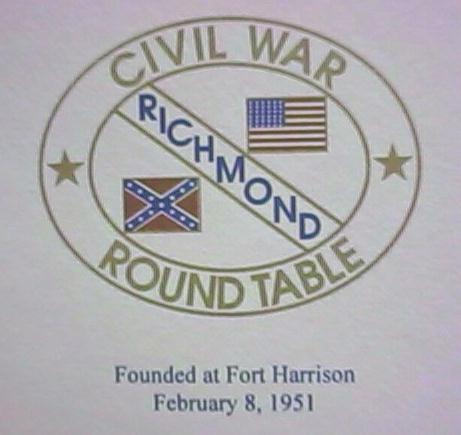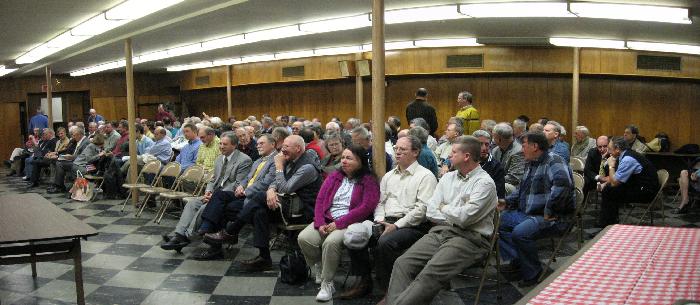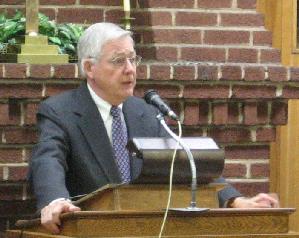


March 2005
rcwrt.org
First Vice President: Rob Monroe, Editor Richard Forrester 2416 Edenbrook Dr. Second Vice President: Richmond, VA 23228-3040 Shep Parsons RMonroe500@comcast.net
March 2005 PROGRAM Stephen W. Sears 8:00 p.m., Tuesday, March 8, 2005, at the Boulevard United Methodist Church, 321 N. Boulevard, Richmond, VA (corner of Boulevard and Stuart Ave.) Enter the basement door on the right side under the front steps. Stephen W. Sears worked for American Heritage Publishing for 24 years, most of that time as a book editor. He has written or edited a dozen books on the Civil War, including a biography of General George McClellan (George B. McClellan: The Young Napoleon) and an edition of his papers (The Civil War Papers of George B. McClellan: Selected Correspondence, 1860-1865); and campaign histories of the Peninsula (To the Gates of Richmond: The Peninsula Campaign); Antietam/Sharpsburg (Landscape Turned Red: The Battle of Antietam); Chancellorsville; and most recently, Gettysburg. Praised by the New York Times Book Review as "arguably the preeminent living historian of the war's eastern theater," Mr. Sears has won numerous awards including three Fletcher Pratt Awards from the New York Civil War Round Table (for Chancellorsville, Antietam and Gettysburg). He makes his home in Connecticut.
Reminder March 15th is the final deadline to pay your Richmond Civil War Round Table dues for 2005. If you have not already done so, please come prepared to pay your dues at the March meeting. Thank you!
A great crowd turned out in Feburary meeting to hear 'Bud" speak!
 |
Summary of the February Meeting
 |
Bookseller Offers Discount to RCWRT Members History Out-of-Print, a business specializing in military history books and biographies, is offering a 10% discount to members of the Richmond Civil War Round Table. In addition to out-of-print books, the business buys and sells rare and antiquarian books. History Out-of-Print offers hundreds of books on the Civil War and features a free, no obligation search service. David Ebrite History Out-of-Print 130-C John Morrow Pkwy, #105 Gainesville, GA 30501 1-770-532-5747 Fax 1-770-532-0166 www.historyoutofprint.com
Upcoming Events
Saturday, April 2. The Friends of Petersburg Battlefield will host a Pig Roast-Cookout in memory of veterans on the 140th Anniversary of the Fall of Petersburg. The public is invited for the event being held from noon to dusk at Robert E. Lee Park in Petersburg. Free tours of the battlefield area will be conducted throughout the afternoon. Donations will be accepted towards the placement of Virginia Civil War Trail signs along the Flank and Defense Roads. The Friends of Petersburg Battlefield is a grass roots, non-profit organization determined to restore some glory and, at a minimum, identification to forts that are "dormant" and neglected. Info: Cheryl Moody (804) 895-1070, brickhouserun@aol.com or: www.craterroad.com/friendsofthebattlefield.html
Thursday, April 7. "When War Came This Way: Women's Experiences During the Civil War in Virginia," lecture by retired Brig. Gen. John W. Mountcastle. In every Virginia community, women endured anxiety and heartbreak, trauma and quiet privation. Their varied experiences and reactions are the subject of this lecture by RCWRT member Jack Mountcastle. A 32-year veteran of the U.S. Army, he taught at the U.S. Military Academy at West Point and later commanded the Army Center of Military History in Washington. Lecture begins at noon at the Virginia Historical Society on Boulevard in Richmond. Info: www.vahistorical.org or (804) 358-4901.
Saturday, April 9. Historian and RCWRT member Dr. John Coski will sign copies of his new book, The Confederate Battle Flag: America's Most Embattled Emblem, at the Museum of the Confederacy on E. Clay St. in downtown Richmond. Book signing from noon to 5pm, talk at 3pm. Info: www.moc.org or (804) 649-1861.
Chesterfield County Site Included on List of Most Endangered Battlefields At a February 24 news conference broadcast live by C-Span, the Civil War Preservation Trust presented its list of the ten most endangered battlefields in America. Included on the list are battlefields at Franklin, TN; Raymond, MS; Mansfield, LA; Kennesaw Mountain, GA; Wilson's Creek, MO; Morris Island, SC; and Knoxville, TN. Three Virginia sites made the list including the battlefields at Spotsylvania, Manassas and Bermuda Hundred in Chesterfield County. Bermuda Hundred was never intended to be a battlefield. Instead, this peninsula jutting into the James River was supposed to be the starting point for a victorious Union effort to seize control of Richmond. Unfortunately for the Union cause, cautiousness and mediocrity conspired to transform the Bermuda Hundred Campaign into a series of bloody but inconclusive battles that eventually developed into grim trench warfare. Today, the fate of the Bermuda Hundred battlefields seems equally grim. Most of the siege lines and battlefields have already succumbed to sprawl. Chesterfield County has protected 122 acres of hallowed ground associated with the Bermuda Hundred Campaign, creating a chain of small parks that protect isolated parts of the battlefields. The National Park Service has protected some additional land at Parker's Battery and nearby Drewry's Bluff (Fort Darling). However, much more work needs to be done. Ware Bottom Church, the site of fighting on May 20, 1864, is considered the most threatened. Commercial development along Route 10 is also having an adverse effect on the remaining Bermuda Hundred battlefields.
RCWRT Monthly Speakers for 2005
Thanks to all of you who have signed up to receive the newsletter through your email. We greatly appreciate your assistance in helping the Richmond Civil War Round Table to save $$. If you would like to receive the newsletter via email, please send your name and email address to RMonroe500@comcast.net Many thanks!
Information may be emailed to RMonroe500@comcast.net or Richmond Civil War Round Table Newsletter Rob Monroe, Editor 2416 Edenbrook Dr. Richmond, VA 23228-3040
Return to News Letters Index
Return to main page

©R.C.W.R.T. 2005